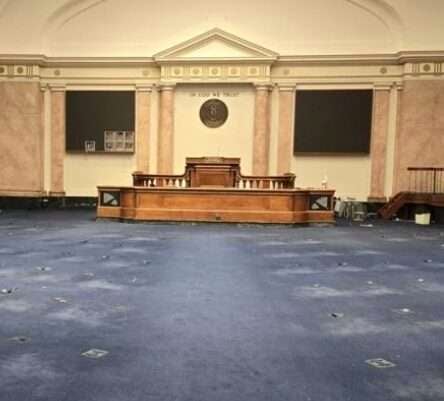“Kentucky Kernel editor-in-chief and reporter William Wright appeals the University of Kentucky’s denial of his request ‘to obtain copies of all records detailing the investigation by the University of Kentucky or the Office of Institutional Equity and Equal Opportunity of a tenured professor and any allegations of sexual harassment, sexual assault, or any other misconduct by [the professor].’
“The university promptly denied Mr. Wright’s request explaining that “all records detailing the . . . investigation from the University’s Office of Institutional Equity and Equal Opportunity are unable to be released.”
Thus began the August 2016 Attorney General’s open records decision in favor of the public’s right of access to properly redacted copies of the requested investigatory records — one of the last I authored before leaving the office.

The years’ long litigation that resulted from that decision culminated in Friday’s oral argument before the Kentucky Supreme Court and will, in time, result in a final adjudication of the issue presented to the Attorney General in 2016.
That issue? Whether privacy interests predicated on various state and federal laws supersede the public’s right to records detailing a public university’s investigation of multiple complaints of sexual assault by a public employee —in these cases, a tenured professor — of his students.
In other words, whether the university properly discharged its duty to conduct a thorough, fair, and wholly unbiased investigation into allegations of egregious misconduct leveled against a professor and whether, thereafter, the University imposed appropriate disciplinary measures.
Everything about the appeal and the underlying facts, including the number of actual complaints made against Professor James Harwood, was vague in 2016 and remains vague to this day.
Certainly, the University was not forthcoming when the Kentucky Attorney General tried to nail down the facts, accusing the Attorney General of advocating for The Kernel.
Even the Kentucky Supreme Court Justices struggled with the underlying facts at oral argument, including the basic question of how many complaints were leveled against Harwood.
What was clear from the scant records disclosed to The Kernel was that Harwood was permitted to resign under the remarkably generous terms of a separation agreement that allowed him to retain his tenured status, extended his salary and benefits well beyond his employment, and included a confidentiality clause that obligated the university not to disparage him.
Such deals are apparently common in the world of academia, enabling the university to avoid litigation and the professor to quietly depart with no stain on his or her reputation — perhaps to “re-offend” at another university.
But in this case, The Kernel learned of the investigation — in part because Harwood’s victims were deeply outraged by the University’s kid-glove treatment of Harwood.
In oral arguments before the Supreme Court on October 23, the University mightily endeavored to obscure the central issue of public agency accountability thru public records — which lies at the heart of the open records law — by framing the issue before the court as one of victims’ rights.
And considerable time was devoted to that issue as the University expounded on their statutorily protected privacy rights in their “education records” as students, and their constitutionally protected privacy rights as victims, in the details uncovered in the investigation.
But at a certain level, non-identifying details are important here to verify the depth, thoroughness, and fairness of the University’s investigative inquiry as well as the appropriateness of the “discipline” the University imposed.
(The University’s alternate argument based on the preliminary documents exceptions is a throwaway. The University knows, as does anyone with a basic understanding of the open records law, that “a resignation from a position by an employee before the [the agency] has reached a decision concerning possible termination is a ‘final action’”).
Ultimately, University of Kentucky v The Kernel Press, Inc., d/b/a The Kentucky Kernel will decide whether a public university can evade accountability for its actions, and those of its errant employees, by erecting an impenetrable privacy smoke screen.
Neither The Kernel, nor then-Kentucky Attorney General Andy Beshear, nor the Kentucky Court of Appeals was unmindful of the victim’s privacy rights in attempting to secure the public’s right to know how the University of Kentucky discharged *its* statutory duty to investigate the charges made by multiple students against a tenured faculty member.
At every level, deference was accorded those rights in recognizing the University’s ability to redact the victims’ personally identifiable information from the investigative records.
And the notion that we must simply trust the University that such redaction is impossible is an insult to students who attend the University, parents who pay tuition for their children to attend the University, and taxpayers who fund the University — not to mention a law that is premised on the right to verify rather than simply trust.
Make no mistake.
Reversal of the Court of Appeals’ opinion will open the floodgates to institutional secrecy at the university level that will be regularly exploited under the sanctimonious guise of protecting student privacy.
But whose “privacy” is the University of Kentucky actually protect?
Amye Bensenhaver is a former assistant attorney general and founder of the Kentucky Open Government Coalition.

















